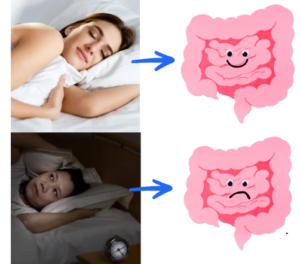The role of sleep in digestion
Quality sleep is crucial for proper digestion, even though its impact may not be immediately apparent. The relationship between sleep and digestion is intricate and multi-dimensional, involving various physiological processes. The circadian rhythm governs the sleep-wake cycle, called the body clock. The circadian rhythm plays a crucial role in regulating the digestive system, leading to a predictable feeling of hunger at specific times of the day.
Rest and restoration 
Getting enough sleep is crucial for the body to heal, revitalise, and restore itself. The deep stages of sleep are critical. Throughout this period, the organs, tissues, and cells comprising the digestive system have the opportunity to not only rest but also undergo necessary repair. During deep sleep, the body focuses on cellular repair and growth, ensuring optimal functioning and rejuvenation. One crucial aspect is the repair of the cells that line the digestive tract. These cells endure constant exposure to food particles and digestive juices, leading to wear and tear over time. Proper sleep is essential for regenerating cells, particularly those in the gastrointestinal lining, which enhances digestion and maintains its integrity.
Getting a good night's sleep is crucial for maintaining a robust immune system. This is especially important for the digestive system, which relies on its specialised immune cells activated by the beneficial bacteria in the gut. These immune cells safeguard the gut and digestive system from potentially harmful microbes.
The digestive organs play a crucial role in the detoxification process by efficiently eliminating waste and harmful substances. Deep sleep enhances the efficiency of the liver and kidneys, promoting optimal functioning.
Gut Motility
Efficiently moving food and waste through the digestive tract is a crucial aspect of digestion. Gut motility undergoes some alterations during sleep. While you're catching some Zs, whether in a deep slumber or a lighter snooze, the pace at which your gut moves is noticeably slowed down. This slowdown is an essential adjustment where the digestive system conserves energy, which is then redirected towards repairing digestive tissues. By optimising digestion during the day, you can enhance its efficiency.
The migrating motor complex is a rhythmic pattern of contractions that occurs in cycles when an individual is not consuming food. This includes periods of intentional fasting and sleep, during which fasting happens naturally. This process is crucial to gut motility, effectively clearing away any lingering food particles and debris within the digestive system. By cleansing the digestive tract, you can effectively minimise the risk of bacterial overgrowth and promote a balanced and thriving gut environment. The migrating motor complex is most active at night when the person is fasting and asleep—emphasising the significance of sleep for maintaining optimal digestive system health.
Upon awakening, the natural rhythm of your digestive system begins to pick up pace. This primes the digestive system, ensuring it's fully prepared to process and break down food efficiently. Additionally, it can initiate the initial bowel movement of the day, highlighting the intricate connection between sleep and gut motility.
Hormone Regulation
Ghrelin is known for stimulating appetite, earning it the nickname “hunger hormone.” Leptin plays a crucial role in signalling to the brain that the stomach is satisfied, effectively curbing the individual's appetite. Due to this fact, this hormone is commonly referred to as the satiety hormone. Insufficient sleep can have a detrimental impact on these hormones.
A night of poor sleep can disrupt digestion by increasing ghrelin levels. Not only does this enhance your appetite, but it can also trigger a strong desire for carbohydrates. Many people can relate to the sensation called ‘hangry'. Not getting enough sleep can have a negative impact on leptin levels, which in turn disrupts the signal that tells us to stop eating. This combination can lead to a problematic situation where the person indulges in excessive eating, consuming potentially unhealthy foods, and struggling to recognise when to stop. Occasional nights of restless sleep won't have a significant impact.
On the other hand, chronic insomnia can have a profound impact on the gut, triggering inflammation and giving rise to a range of digestive problems. These can include liver disorders, gastroesophageal reflux disease, inflammatory bowel disease, and even colorectal cancer. Additionally, weight gain may also become a concern.
Disrupted sleep
Disrupted sleep can also result in digestive problems. Working shifts, particularly night shifts, and dealing with jet lag can seriously disrupt sleep patterns and reduce the body's natural rhythm. Similarly, consuming food late at night or irregularly can adversely affect sleep. Natural sunlight regulates the circadian rhythm of sleep.
Regrettably, in our modern era, we spend the majority of our waking hours indoors. As a result, the connection between being outdoors and reaping the advantages of natural light is being overshadowed by the prevalence of blue light emitted by electronic devices such as laptops, televisions, mobile phones, and artificial lighting. Exposure to these light sources before bedtime can disrupt your sleep cycle and patterns.
The combination of these factors can lead to symptoms such as diarrhoea, ulcers, and inflammatory bowel disease or disrupt the delicate balance of bacteria in the gut. It also has the potential to harm the gut lining.
Microbiome Health
The microbiome refers to the vast collection of trillions of microbes that reside in the gut. These consist of beneficial bacteria, commonly referred to as probiotics. However, it also encompasses viruses, fungal cells, and specific pathogenic bacteria. Microbes play a crucial role in maintaining overall health, including digestive health. They enhance the immune system, assist digestion, and contribute to the production of vitamins, enzymes, hormones, and amino acids. New research has revealed the fascinating connection between the microbiome and sleep, shedding light on yet another way it contributes to human health. Disrupted sleep or chronic insomnia can profoundly affect the delicate balance of microbes in your body, ultimately affecting your digestive health and overall well-being.
Interplay between the microbiome and sleep
Nevertheless, the relationship between sleep and the microbiome is intricate and highly complex. Sleep quality has a profound impact on the microbiome, while the microbiome's health also influences sleep patterns. Understanding the complicated relationship between sleep and the microbiome is no easy task. However, a study discovered that having a substantial amount of specific bacterial cells in the gut and a diverse range of these cells has been associated with falling asleep faster, experiencing fewer awakenings, having fewer interruptions during the night, and enjoying more restorative sleep. Although it is not feasible to cover all the findings in this article, the main message is that maintaining a healthy balance of beneficial bacteria and promoting a diverse range of bacteria in the gut yields positive results for sleep, digestion, and overall well-being.
Stress, sleep and digestion
Insufficient sleep is a common consequence of stress and anxiety. Similarly, these mental health conditions can also impact the physical health and functioning of the digestive system. These factors can affect gut motility, leading to indigestion, ulcers, and irritable bowel syndrome. Stress significantly impacts digestion, primarily because of cortisol, commonly known as the stress hormone.
Cortisol
When detected, cortisol triggers the body's natural response of fighting or fleeing. As a result, blood flow is redirected to vital organs such as the heart, brain, lungs, and muscles in the limbs, while the digestive system receives less blood. This empowers individuals to confront or escape from whatever is triggering the peril and intense stress. During ancient times, this creature would have been considered a formidable predator.
Nowadays, stress can arise from various sources that may not be life-threatening, such as financial obligations, heavy workloads, or insufficient sleep. Redirecting blood flow, as described, is highly effective in situations where one needs to escape from a predator quickly. This technique ensures that blood flow returns to normal once the threat has subsided. Unfortunately, in today's fast-paced world, chronic stress can take a toll on our digestive system, particularly gut motility. This can result in unpleasant symptoms such as constipation, diarrhoea, indigestion, gas, and bloating. Effective stress management strategies are crucial for maintaining optimal gut health and promoting restful sleep.
Getting ample sleep is crucial for maintaining a healthy digestive system, as sleep and digestion are closely intertwined. It is highly beneficial to prioritise good sleep hygiene. To optimise your sleep quality, it's essential to take specific measures. These include reducing your exposure to blue light emitted by electronic devices, maintaining a consistent sleep schedule, creating a cool and dark sleeping environment, avoiding eating within two hours of bedtime, and getting some natural daylight exposure during the day, particularly in the morning.
References
Digestive health and circadian rhythm
Sleep dysfunction and digestive conditions
The link between the gut microbiome and sleep
Stress and the digestive system
The Article: How Sleep Affects Your Digestive System Appeared First On Nutritionist Pershore.
The Article: The Impact of Sleep on Your Digestive System appeared first on Jane Stevens.
The Article The Impact of Sleep on Your Digestive System Was Found On https://limitsofstrategy.com
The Article The Impact of Sleep on Your Digestive System First Appeared ON
: https://ad4sc.com





Comments are closed